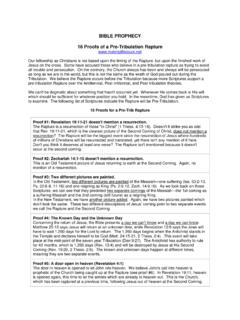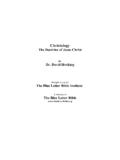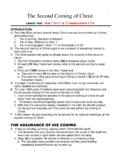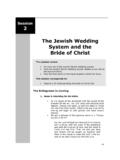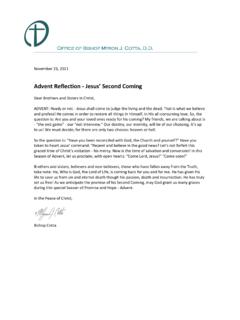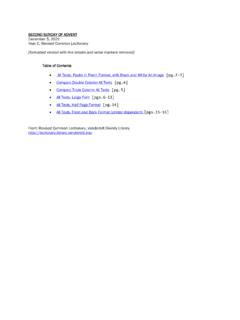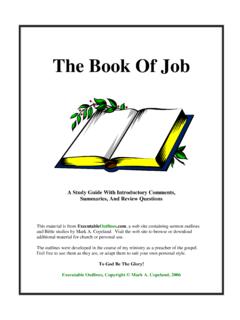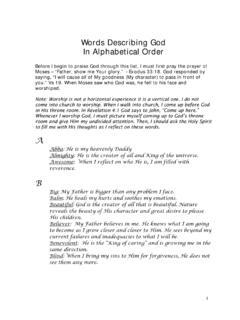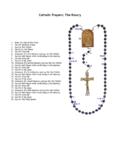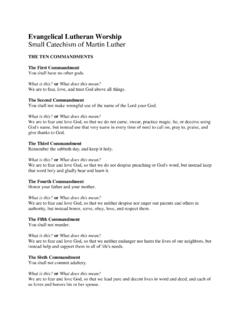Transcription of THE SECOND COMING (1919)
1 THE SECOND COMING (1919) Turning and turning in the widening gyre The falcon cannot hear the falconer; Things fall apart; the centre cannot hold; Mere anarchy is loosed upon the world, The blood-dimmed tide is loosed, and everywhere The ceremony of innocence is drowned; The best lack all conviction, while the worst Are full of passionate intensity. Surely some revelation is at hand; Surely the SECOND COMING is at hand. The SECOND COMING ! Hardly are those words out When a vast image out of Spiritus Mundi Troubles my sight: a waste of desert sand; A shape with lion body and the head of a man, A gaze blank and pitiless as the sun, Is moving its slow thighs, while all about it Wind shadows of the indignant desert birds.
2 The darkness drops again but now I know That twenty centuries of stony sleep Were vexed to nightmare by a rocking cradle, And what rough beast, its hour come round at last, Slouches towards Bethlehemto be born? Turning and turning in the widening gyreThe falcon cannot hear the falconer;Things fall apart; the centre cannot hold;Mere anarchyis loosed upon the worldThe blood-dimmed tide is loosed,and everywhere The ceremony of innocence is drowned;Surely some revelation is at hand; / Surely the SECOND COMING is at SECOND COMING !Hardly are those words out When a vast image out of Spiritus Mundi Troubles my sight:a waste of desert sand; A shape with lion body and the head of a man, A gaze blank and pitiless as the sun, A shape with lion body and the head of a man, A gaze blank and pitiless as the moving its slow thighswhile all about it Wind shadows of the indignant desert birdsThe darkness drops again but now I know That twenty centuries of stony sleep Were vexed to nightmare by a rocking cradle,And what rough beast, its hour come round at last, Slouches towards : Image represents no particular : Image represents no particular what rough beast, its hour come round at last, Slouchestowards be born?
3 (Slouches to be born ??)February 12, 2007, EDITORIAL OBSERVERWhat W. B. Yeats s SECOND COMING Really Says About the Iraq WarBy ADAM COHENThe Brookings Institution, the prominent Washington research organization, just released a report on the Iraq war entitled Things Fall Apart. When Representative Jim McDermott, Democrat of Washington, took to the House floor last year to demand that President Bush present a plan for Iraq, he called his speech The Center Cannot Hold. Blogs are full of the observation that the blood-dimmed tide is loosed in Iraq these phrases all come from William Butler Yeats s SECOND COMING . Yeats s bleakly apocalyptic poem has long been irresistible to historical era, after all, is not neatly summed up by his lament that The best lack all conviction, while the worst/Are full of passionate intensity ?
4 But with its somber vision of looming anarchy, and its Middle Eastern backdrop (the terrifying beast Yeats warns of slouches towards Bethlehem ), The SECOND COMING is fast becoming the official poem of the Iraq pundits who quote it, though, are picking up on Yeats s words, but not his world view. As Helen Vendler, the great Harvard poetry scholar, and others have pointed out, The SECOND COMING is really two poems. The first eight lines are filled with the pointed aphorisms that pundits like so much, while the rest of the poem suggests the unpredictability of how history will SECOND , less quoted part is the one that speaks most directly to the grim situation in wrote The SECOND COMING in 1919, an especially dismal moment in history.
5 Europeans were shell-shocked from World War I, and deeply cynical. Yeats s homeland, Ireland, was lurching toward civil old order in Russia had just been toppled by a revolution that Yeats who had a fondness for aristocracy feared would spread across the continent and the s perspective on the world s troubles was not what many people who quote him today might suspect. For one thing, he was not a Christian [note: he was a Protestant but yes he was not an orthodox Christian]. He dabbled in theosophy and the occult, and considered Christianity an idea whose time had passed. The SECOND COMING is not, as its title and the Bethlehem reference might suggest, an account of the return of the Messiah.
6 What is being born is nothing resembling for his politics, Yeats was hardly a democrat, and he did not care much for progress which makes him an odd choice for people who hope to turn Iraq into a vibrant democracy. Yeats was attracted to fascism, and he rebelled as a youth against the adults talk of progress by embracing its opposite. I took satisfaction in certain public disasters, felt sort of ecstasy at the contemplation of ruin, he once first eight lines of The SECOND COMING , as Ms. Vendler notes, are the philosophical part of the poem. A rational, thinking observer a pundit, of sorts is describing the world in definite, if foreboding, terms. The falcon cannot hear the falconer paints a vivid image of the natural order COMING apart.
7 Mere anarchy is loosed upon the world describes an onslaught of destruction almost matter-of-factly. But after those eight lines, the poem suddenly becomes, as Ms. Vendler notes, oracular. Like the Delphic oracle, this Yeats speaks cryptically. Surely the SECOND COMING is at hand, he says but of course, surely here means its opposite: what follows is not certain at all. Yeats goes on to announce somewhere in sands of the desert/ A shape with lion body and the head of a man an indefinite creature in an indefinite poem reflects, as Harold Bloom, the Yale professor and literary critic, says, Yeats s belief that a change in god was COMING , and that the 2,000-year reign of Christianity was about to end.
8 But it does not reveal who this god will be. Its last two lines are a question: And what rough beast, its hour come round at last,/ Slouches towards Bethlehem to be born? The SECOND COMING is a powerful brief against punditry. The Christian era was about the ability to predict the future: the New Testament clearly foretold the SECOND COMING of christ . In the post-Christian era of which Yeats was writing there was no Bible to map out what the next COMING would world would have to look toward Bethlehem to see what rough beast skepticism about predicting the future has more relevance to the Iraq war than any of the poem s much-quoted first eight lines. The story of the Iraq war is one of confident predictions that never came to pass: We will find weapons of mass destruction ; we will be greeted as liberators ; the insurgency is in its last throes.
9 The confident predictors who have been wrong in the past do not hesitate to keep offering up plans. That is true of President Bush, certainly: he talks about what his troop surge will do as if he had never been wrong before. It is also true of the pundits. The co-author of Things Fall Apart, the Brookings guide to going forward in Iraq, is Kenneth Pollack, who is incredibly best known for his 2002 book The Threatening Storm: The Case for Invading Iraq. It is bizarre to see shards of The SECOND COMING appended to the Brookings report, or to any of the other plans and prognostications about the war in Iraq. Yeats, who grew up feeling sort of ecstasy at the contemplation of ruin, did not just welcome whatever new order his rough beast was ushering in.
10 He believed the only way it could plausibly be spoken of was in the form of a to ByzantiumThat is no country for old men. The youngIn one another's arms, birds in the trees--Those dying generations--at their song,The salmon-falls, the mackerel-crowded seas,Fish, flesh, or fowl, commend all summer longWhatever is begotten, born, and in that sensual music all neglectMonuments of unageing aged man is but a paltry thing,A tattered coat upon a stick, unlessSoul clap its hands and sing, and louder singFor every tatter in its mortal dress,Nor is there singing school but studyingMonuments of its own magnificence;And therefore I have sailed the seas and comeTo the holy city of YeatsO sages standing in God's holy fireAs in the gold mosaic of a wall,Come from the holy fire, perne in a gyre,And be the singing-masters of my my heart away; sick with desireAnd fastened to a dying animalIt knows not what it is; and gather meInto the artifice of out of nature I shall never takeMy bodily form from any natural thing,But such a form as Grecian goldsmiths makeOf hammered gold and gold enamellingTo keep a drowsy Emperor awake.


